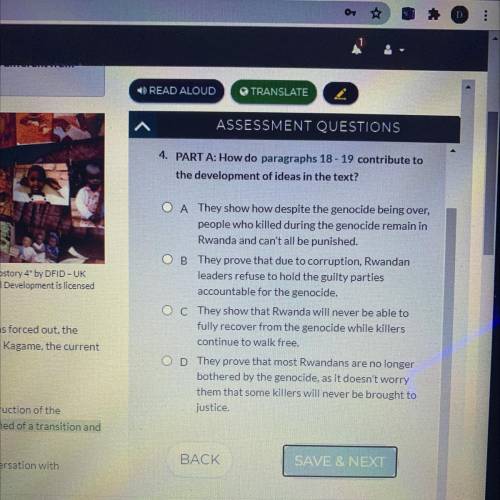
English, 02.11.2020 14:00 kulfif8441
4. PART A: How do paragraphs 18 - 19 contribute to
the development of ideas in the text?
O A They show how despite the genocide being over,
people who killed during the genocide remain in
Rwanda and can't all be punished.
OB They prove that due to corruption, Rwandan
leaders refuse to hold the guilty parties
accountable for the genocide.
O c They show that Rwanda will never be able to
fully recover from the genocide while killers
continue to walk free.
D They prove that most Rwandans are no longer
bothered by the genocide, as it doesn't worry
them that some killers will never be brought to
justice.


Answers: 3


Another question on English

English, 21.06.2019 16:30
Ineed the answer asap pl 22. give an example of how oscar wilde uses irony to achieve social commentary in the play. you can discuss the irony of the title. respond in complete sentences.
Answers: 1

English, 22.06.2019 01:00
What favorite memory did the giver share with jonas? in the giver.
Answers: 2

English, 22.06.2019 04:50
Read the passage, then answer the question that follows. no one could have seen it at the time, but the invention of beet sugar was not just a challenge to cane. it was a hint—just a glimpse, like a twist that comes about two thirds of the way through a movie—that the end of the age of sugar was in sight. for beet sugar showed that in order to create that perfect sweetness you did not need slaves, you did not need plantations, in fact you did not even need cane. beet sugar was a foreshadowing of what we have today: the age of science, in which sweetness is a product of chemistry, not whips. in 1854 only 11 percent of world sugar production came from beets. by 1899 the percentage had risen to about 65 percent. and beet sugar was just the first challenge to cane. by 1879 chemists discovered saccharine—a laboratory-created substance that is several hundred times sweeter than natural sugar. today the sweeteners used in the foods you eat may come from corn (high-fructose corn syrup), from fruit (fructose), or directly from the lab (for example, aspartame, invented in 1965, or sucralose—splenda—created in 1976). brazil is the land that imported more africans than any other to work on sugar plantations, and in brazil the soil is still perfect for sugar. cane grows in brazil today, but not always for sugar. instead, cane is often used to create ethanol, much as corn farmers in america now convert their harvest into fuel. –sugar changed the world, marc aronson and marina budhos how does this passage support the claim that sugar was tied to the struggle for freedom? it shows that the invention of beet sugar created competition for cane sugar. it shows that technology had a role in changing how we sweeten our foods. it shows that the beet sugar trade provided jobs for formerly enslaved workers. it shows that sweeteners did not need to be the product of sugar plantations and slavery.
Answers: 1

English, 22.06.2019 05:00
Read the passage to determine the meaning of the word humanities. studying the humanities, such as art, literature, and philosophy, can you understand an ancient society. use the drop-down menus to answer the questions. what is the most likely meaning of the word humanities?
Answers: 1
You know the right answer?
4. PART A: How do paragraphs 18 - 19 contribute to
the development of ideas in the text?
O A...
O A...
Questions



Mathematics, 27.06.2019 04:30







Arts, 27.06.2019 04:30



Biology, 27.06.2019 04:30



Mathematics, 27.06.2019 04:30






